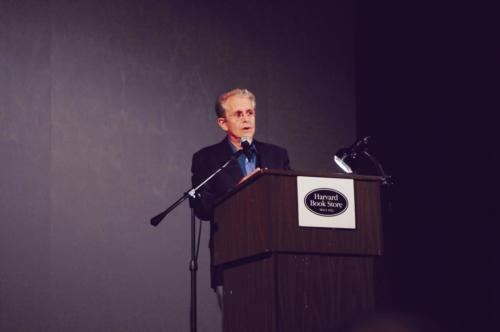
Professor of Constitutional Law Laurence H. Tribe discusses his new book, The Invisible Constitution, last night at the Brattle Theater.
With two weeks until the presidential election and the composition of the Supreme Court potentially hanging in the balance, Harvard Law School professor Laurence H. Tribe ’62 spoke last night about the need to reevaluate how we interpret the Constitution.
He drew his arguments from his latest book, “The Invisible Constitution,” which calls for a deeper reading of the governing document and insists that we have to learn to interpret it from what is not explicitly stated within the text.
“There is nothing in the Constitution to tell you how to read the Constitution,” Tribe said, expounding on his well-known criticism of “strict constructionists,” or those who say the Constitution should be interpreted literally.
Tribe developed his argument from the Ninth Amendment, which reserves rights for “the people.” Many legal experts argue that a host of rights—such as the right to privacy, which underpins Supreme Court decisions including Roe v. Wade—emanate from the amendment.
A distinguished constitutional law professor who has argued three dozen cases before the Supreme Court, Tribe’s book proposes six different models that he said help to decipher the Constitution’s meaning. Last night, he discussed two of those models, what he called the geometric and geological models.
In the geometric model, Tribe—who studied mathematics as an undergraduate—states that the Constitution’s amendments are specific points and that readers of the Constitution have to decipher the “underlying nature of human dignity that these points define.”
The geological model states that we must dig beneath explicit statements to understand their original premises.
As an example of this second model, Tribe said that the right to not be subjected to unreasonable searches and seizures presupposes a degree of personal autonomy from the government.
Tribe gave several examples of the importance and relevance of analyzing the Constitution, including a recent report uncovering a Bush administration memorandum that used the 1993 Religious Freedom Restoration Act to condone federal spending on religious organizations that practiced discrimination.
Members of the audience said they enjoyed Tribe’s talk, though at least one person came away with more than an enhanced understanding of constitutional interpretation.
Eric T. Fossel, a professor of radiology at Harvard Medical School, said Tribe’s remarks persuaded him to vote for Democratic presidential hopeful Barack Obama, who had been Tribe’s student and research assistant during Obama’s time at the Law School. [SEE CORRECTION BELOW]
Fossel said that he was won over to the Democrat’s side after Tribe noted that John McCain adheres to much of the same judicial philosophy as President Bush.
CORRECTION
The Oct. 21, "Courts Center of Tribe Talk," erroneously reported that Eric T. Fossel is a professor of radiology at Harvard Medical School. In fact, he served as a radiology professor for 25 years but left in 1995 to build a Cambridge-based biotechnology company.
Read more in News
Editor Urges U.S.-Asia Ties












